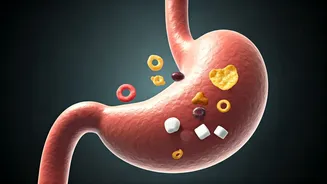Food Choice Matters
The gut, often hailed as the body's second brain, is a complex ecosystem where trillions of bacteria reside. The food we consume significantly impacts
this ecosystem, influencing our overall health. While many foods are beneficial, some, despite their reputation, can lead to digestive distress and gut imbalances. These foods, as identified by a Harvard-trained gastroenterologist, are often marketed as healthy but contain elements that can cause inflammation and disrupt the delicate balance of gut flora. Understanding these culprits is the first step toward promoting a healthier digestive system and overall well-being, as choosing the right foods is key to maintaining a robust and thriving gut environment.
Hidden Sugar Overload
One of the key offenders is the overconsumption of artificial sweeteners. Many individuals often incorporate artificial sweeteners, believing them to be a healthier alternative to sugar; however, these sweeteners can wreak havoc on gut health. These substances, which include aspartame, sucralose, and saccharin, can alter the composition of gut bacteria and cause inflammation. Artificial sweeteners, devoid of any nutritional value, can also trigger changes in the gut microbiome, leading to a reduction in beneficial bacteria and a possible increase in harmful ones. This shift can disrupt the delicate balance of the gut, causing digestive issues such as bloating, gas, and discomfort. In contrast to natural sweeteners like honey or maple syrup, the frequent consumption of artificial sweeteners does not supply any nutritional value, thereby making it challenging for gut health to recover.
Excessive Fructose
Fruit juices, though often considered healthy, can be a major source of fructose, a type of sugar that can pose problems for the gut. While fruits contain fructose, the concentration is much higher in juices due to the removal of fiber during processing. Fiber plays a critical role in digestion by slowing down the absorption of sugar and supporting the growth of beneficial gut bacteria. The absence of fiber in juices leads to a rapid influx of fructose into the gut, which can overwhelm the digestive system. In individuals with fructose intolerance, this can result in symptoms such as abdominal pain, diarrhea, and bloating. Even in those without intolerance, excessive fructose intake can contribute to gut inflammation and imbalances. The high sugar content in many juices, along with the lack of fiber, makes it a less-than-ideal choice for gut health, prompting you to perhaps rethink your morning glass of orange juice.
Processed Foods
Processed foods are a significant contributor to poor gut health. These foods typically include a wide array of additives, preservatives, and unhealthy fats, all of which can damage the gut lining and disrupt the balance of gut bacteria. Often, processed foods contain high levels of saturated and trans fats, which can trigger inflammation in the gut and impact the gut's ability to function properly. The additives found in processed foods can also have a negative impact. Emulsifiers, for instance, are designed to enhance texture and shelf life, but they can disrupt the gut barrier and promote inflammation. Preservatives, while crucial for keeping foods fresh, can also affect gut bacteria. This can reduce the diversity of the gut microbiome, increasing the risk of digestive issues. Choosing whole, unprocessed foods is a key strategy for supporting a healthy gut and overall well-being.
Gluten's Impact
Gluten, a protein found in wheat, barley, and rye, is a common culprit in gut-related problems for a large segment of the population. Although it might not cause issues in everyone, it is a source of inflammation and gut discomfort for many. For individuals with celiac disease, gluten causes a severe autoimmune reaction that damages the small intestine. Even those without celiac disease might experience non-celiac gluten sensitivity, leading to symptoms like bloating, abdominal pain, and fatigue. Gluten can cause increased intestinal permeability, often referred to as “leaky gut,” where the gut lining becomes more porous, allowing substances to pass into the bloodstream that can trigger an immune response. Reducing or eliminating gluten from your diet can often lead to a noticeable improvement in digestive symptoms and overall well-being, especially for those sensitive to it.
Dairy Difficulties
Dairy products, particularly those containing lactose, can cause problems for many individuals, leading to digestive issues. Lactose intolerance, where the body does not produce enough of the enzyme lactase to break down lactose, is a common issue. When lactose isn’t broken down, it remains in the gut and can lead to bloating, gas, and diarrhea. Even for those without lactose intolerance, dairy can still cause problems. Casein, another protein found in dairy, has been linked to inflammation and digestive issues. While some people tolerate dairy well, others might experience symptoms ranging from mild discomfort to more severe issues. Opting for lactose-free products or alternative options like almond or soy milk can make a significant difference in digestive comfort and overall gut health.



















